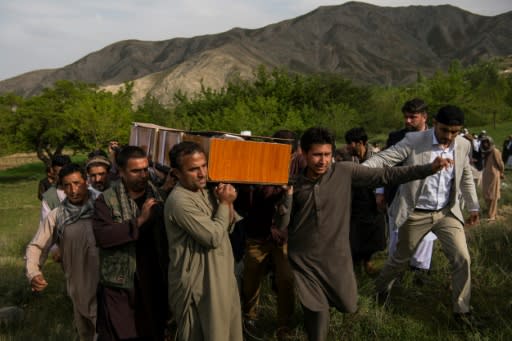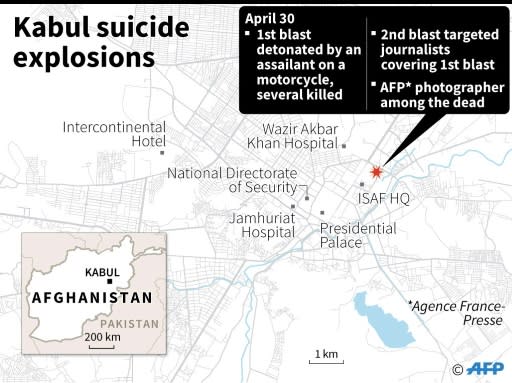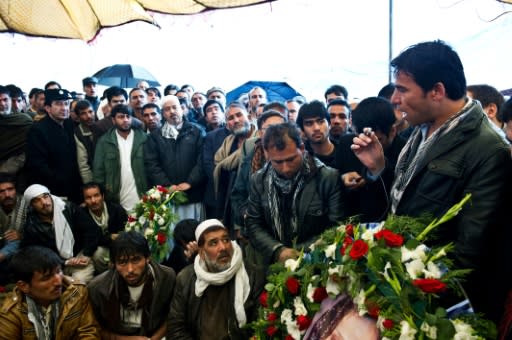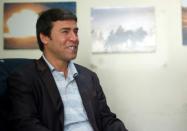Ten journalists including AFP photographer among dozens killed in Afghan attacks
Ten journalists including Agence France-Presse's chief photographer in Kabul, Shah Marai, were among dozens killed in attacks across Afghanistan Monday, the deadliest day for the country's media since 2001. The attacks highlight the dangers journalists face in the war-torn country, where violence is increasing as the resurgent Taliban step up their campaign while the Islamic State group makes inroads. A double suicide blast in Kabul killed 25 people, including Marai along with at least eight other journalists, and wounded 49. Reporters Without Borders called it the most lethal single attack on the media since the fall of the Taliban. IS claimed the attack, which was condemned by the United Nations and the European Union. Kabul police spokesman Hashmat Stanikzai said the second explosion came minutes after the first and targeted reporters at the scene. "The bomber disguised himself as a journalist and detonated himself among the crowd," he said. The BBC confirmed that one of its reporters, 29-year-old Ahmad Shah, was killed in a separate attack in eastern Khost province, near the border with Pakistan. He was shot by unidentified armed men, the broadcaster said, citing local police. In a third attack, 11 children were killed and 16 people wounded, including Romanian and Afghan soldiers, when a suicide attacker exploded his car near a NATO convoy in the southern province of Kandahar, officials said. The children killed were six to 11 years old, the United Nations children's agency UNICEF said in a statement condemning the attack "in the strongest possible terms." There was no immediate claim of responsibility for that attack. One American soldier was killed and another wounded during a combat operation in eastern Afghanistan, US Forces-Afghanistan said in a statement, bringing the total number of people killed across the country to at least 38. "Several Afghan security force members were killed or wounded" in the operation, it added. - Treasured colleague - UN Secretary-General Antonio Guterres said he was "outraged" by the attacks. "The deliberate targeting of journalists in the attack highlights once again the risks media professionals face in carrying out their essential work," the UN chief said. US Defense Secretary Jim Mattis said militants were targeting journalists in Afghanistan because they are weakened and want more news coverage in order to undermine the country's electoral process ahead of an expected vote in October. "This is the normal stuff by people who cannot win at the ballot box, so they turn to bombs," said Mattis. Journalists from Radio Free Europe and Afghan broadcasters Tolo News and 1TV were among those killed in Kabul, Reporters Without Borders said. "This tragedy reminds us of the danger that our teams continually face on the ground and the essential role journalists play for democracy," said Fabrice Fries, CEO of AFP. Marai -- who was buried later Monday -- joined AFP as a driver in 1996, the year the Taliban seized power, and began taking pictures on the side, covering stories including the US invasion in 2001. In 2002, he became a full-time photo stringer, rising through the ranks to become the bureau's chief photographer. The 41-year-old's versatility and easy camaraderie was demonstrated moments before the second attack, as he reassured an AFP video colleague who was stuck in traffic and could not reach the scene. "No worry man, I am here," he said by WhatsApp, adding that he was shooting video in addition to taking photos. He left behind six children, including a newborn daughter. "This is a devastating blow for the brave staff of our close-knit Kabul bureau and the entire agency," said AFP global news director Michele Leridon, describing Marai as a "treasured colleague." "We can only honour the extraordinary strength, courage, and generosity of a photographer who covered often traumatic, horrific events with sensitivity and consummate professionalism," Leridon said. "We also send our condolences to the families of other journalists killed in this terrible attack." - Bloody summer - IS, which dramatically stepped up its attacks in Kabul in recent months, claimed responsibility via its propaganda agency Amaq. The attacks came days after the Taliban began their spring offensive in an apparent rejection of calls for the militants to take up the Afghan government's offer of peace talks. Reporters Without Borders said that since 2016, it has recorded the killings of 34 journalists in Afghanistan, which it ranks at 118 out of 180 countries on the Press Freedom Index. In 2016, seven employees of popular TV channel Tolo were killed in a Taliban suicide bombing. In November last year broadcaster Shamshad TV was stormed by gunmen who killed one person. The defiant station was back on the air within hours, a newscaster with bandaged hands reporting on the attack as its director vowed: "They cannot silence us." President Ashraf Ghani's government is under pressure on multiple fronts this year as it prepares to hold long-delayed legislative elections in October. Some Western and Afghan officials expect 2018 to be a particularly bloody year, with the Taliban and other militant groups controlling or contesting large swathes of the country. "I taught myself photography," Marai said in a company profile in 2015. "Now my photos appear around the world. "My best memories are when I beat the competition... I like to be first." Relatives and friends of AFP Afghanistan chief photographer Shah Marai Faizi, including hiscolleague Wakil Kohsar (R), carry his coffin before burial in Kabul Map of Kabul locating the deadly twin suicide blasts Along with Marai, two journalists from 1TV and one from Tolo news were among the dead Shah Marai -- who was buried Monday -- joined AFP as a driver in 1996, the year the Taliban seized power, and began taking pictures on the side, covering stories including the US invasion in 2001 Marai is shown speaking in 2014 during the funeral in Kabul for his close friend and colleague slain AFP reporter Sardar Ahmad











